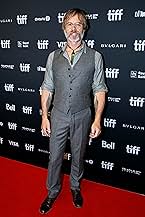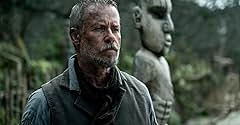IMDb RATING
6.4/10
5.2K
YOUR RATING
A lay preacher arrives at a British settlement in 1830s. His violent past is soon drawn into question and his faith put to the test, as he finds himself caught in the middle of a bloody war ... Read allA lay preacher arrives at a British settlement in 1830s. His violent past is soon drawn into question and his faith put to the test, as he finds himself caught in the middle of a bloody war between Maori tribes.A lay preacher arrives at a British settlement in 1830s. His violent past is soon drawn into question and his faith put to the test, as he finds himself caught in the middle of a bloody war between Maori tribes.
- Awards
- 1 win & 5 nominations total
Featured review
The Convert, director Lee Tamahori's latest historical epic, takes us on a journey to 1830s New Zealand, a land simmering with tribal tensions on the precipice of British colonisation. We meet Munro (Guy Pearce), a disillusioned former soldier turned lay preacher who arrives at a fledgeling British settlement. When he's caught in the crossfire between warring Maori tribes, Munro's faith and identity are put to the ultimate test.
Tamahori doesn't shy away from the complexities of this period. The film beautifully portrays Maori culture, from intricate haka dances to the spiritual significance of moko (facial tattoos). There's a refreshing lack of subtitles for some te reo Maori dialogue, forcing us to immerse ourselves in the world and appreciate the characters' communication struggles. This commitment to authenticity extends to the production design, with meticulously crafted costumes and settlements that transport us back in time.
The Convert occasionally stumbles in its attempt to balance historical accuracy with crowd-pleasing action. The fight choreography, while intense, can veer into slightly unrealistic territory at times. Likewise, the film flirts with the "white saviour" trope in the first act, although Munro thankfully develops a more nuanced relationship with the Maori characters as the story unfolds.
The performances elevate the film. Pearce delivers a solid portrayal of a man grappling with his past and purpose. But it's Tioreore Ngatai-Melbourne as Rangimai, a fierce Maori warrior, who truly steals the show. Her performance is brimming with raw power and vulnerability, making Rangimai a character we can't help but root for. The supporting cast is equally strong, fleshing out the Maori community and the fledgeling British settlers.
The sweeping cinematography captures the breathtaking beauty of New Zealand's landscapes, with rolling hills and lush forests contrasting with the harsh realities of tribal warfare. The score is appropriately evocative, using traditional Maori instruments alongside a more modern orchestral sound. The editing is generally crisp, keeping the pace steady without sacrificing character development.
The Convert isn't a perfect film, but it's a compelling one. It's a visually stunning and thought-provoking exploration of cultural clash, faith, and the fight for survival. While the action sequences might not be the most grounded and the narrative occasionally flirts with clichés, the film's commitment to historical authenticity and the strength of its performances ultimately won me over. If you're looking for a historical epic that's both beautiful and thought-provoking, The Convert is definitely worth a watch. Just be prepared for a bumpy ride along the way, but one that ultimately leads to a rewarding destination.
Tamahori doesn't shy away from the complexities of this period. The film beautifully portrays Maori culture, from intricate haka dances to the spiritual significance of moko (facial tattoos). There's a refreshing lack of subtitles for some te reo Maori dialogue, forcing us to immerse ourselves in the world and appreciate the characters' communication struggles. This commitment to authenticity extends to the production design, with meticulously crafted costumes and settlements that transport us back in time.
The Convert occasionally stumbles in its attempt to balance historical accuracy with crowd-pleasing action. The fight choreography, while intense, can veer into slightly unrealistic territory at times. Likewise, the film flirts with the "white saviour" trope in the first act, although Munro thankfully develops a more nuanced relationship with the Maori characters as the story unfolds.
The performances elevate the film. Pearce delivers a solid portrayal of a man grappling with his past and purpose. But it's Tioreore Ngatai-Melbourne as Rangimai, a fierce Maori warrior, who truly steals the show. Her performance is brimming with raw power and vulnerability, making Rangimai a character we can't help but root for. The supporting cast is equally strong, fleshing out the Maori community and the fledgeling British settlers.
The sweeping cinematography captures the breathtaking beauty of New Zealand's landscapes, with rolling hills and lush forests contrasting with the harsh realities of tribal warfare. The score is appropriately evocative, using traditional Maori instruments alongside a more modern orchestral sound. The editing is generally crisp, keeping the pace steady without sacrificing character development.
The Convert isn't a perfect film, but it's a compelling one. It's a visually stunning and thought-provoking exploration of cultural clash, faith, and the fight for survival. While the action sequences might not be the most grounded and the narrative occasionally flirts with clichés, the film's commitment to historical authenticity and the strength of its performances ultimately won me over. If you're looking for a historical epic that's both beautiful and thought-provoking, The Convert is definitely worth a watch. Just be prepared for a bumpy ride along the way, but one that ultimately leads to a rewarding destination.
- steveinadelaide
- Jun 21, 2024
- Permalink
Storyline
Did you know
- TriviaIn a 2024 interview with Screen Rant, Lee Tamahori spoke about the depiction of Maori warfare in the film and the contrast of directing it versus his experience on Die Another Day (2002): "...we haven't seen combat like this much on film. There's been a film called The Dead Lands (2020), and another couple. There is now a highly trained number of Rakau experts. This is Maori hand to hand combat with edged weapon. They call them patu and taiaha. So there's weapons like most indigenous cultures had spears clubs edged weapons. So there's a lot of people trained in that now, young Maori. They're all in the film. They're a combat unit, which we put together. Action is just something you make up in your head and you do it shot by shot by shot by shot, and work your way through it. To me it is always important, and in the difference between a James Bond action sequence and a Convert action sequence is The Convert the action has to be scarily authentic. It has to be brutal. It's fast. There's no slow motion, no trickery going on. It's just shot by shot by shot, edited down to a point. Whereas with something like most modern action films have speed ramps, and all sorts of post-production tricks on them. But I didn't want to do anything other than show the brutality of hand-to-hand combat as it was."
- GoofsWhen they land for the first time, Munro talks to the crew of the landing boat then rides his horse along the beach. There is a wide shot towards the end of this scene where the boat obviously isn't on the beach.
- How long is The Convert?Powered by Alexa
Details
Box office
- Gross US & Canada
- $5,491
- Opening weekend US & Canada
- $2,963
- Jul 14, 2024
- Gross worldwide
- $764,882
- Runtime1 hour 59 minutes
- Color
- Aspect ratio
- 2.39:1
Contribute to this page
Suggest an edit or add missing content



































